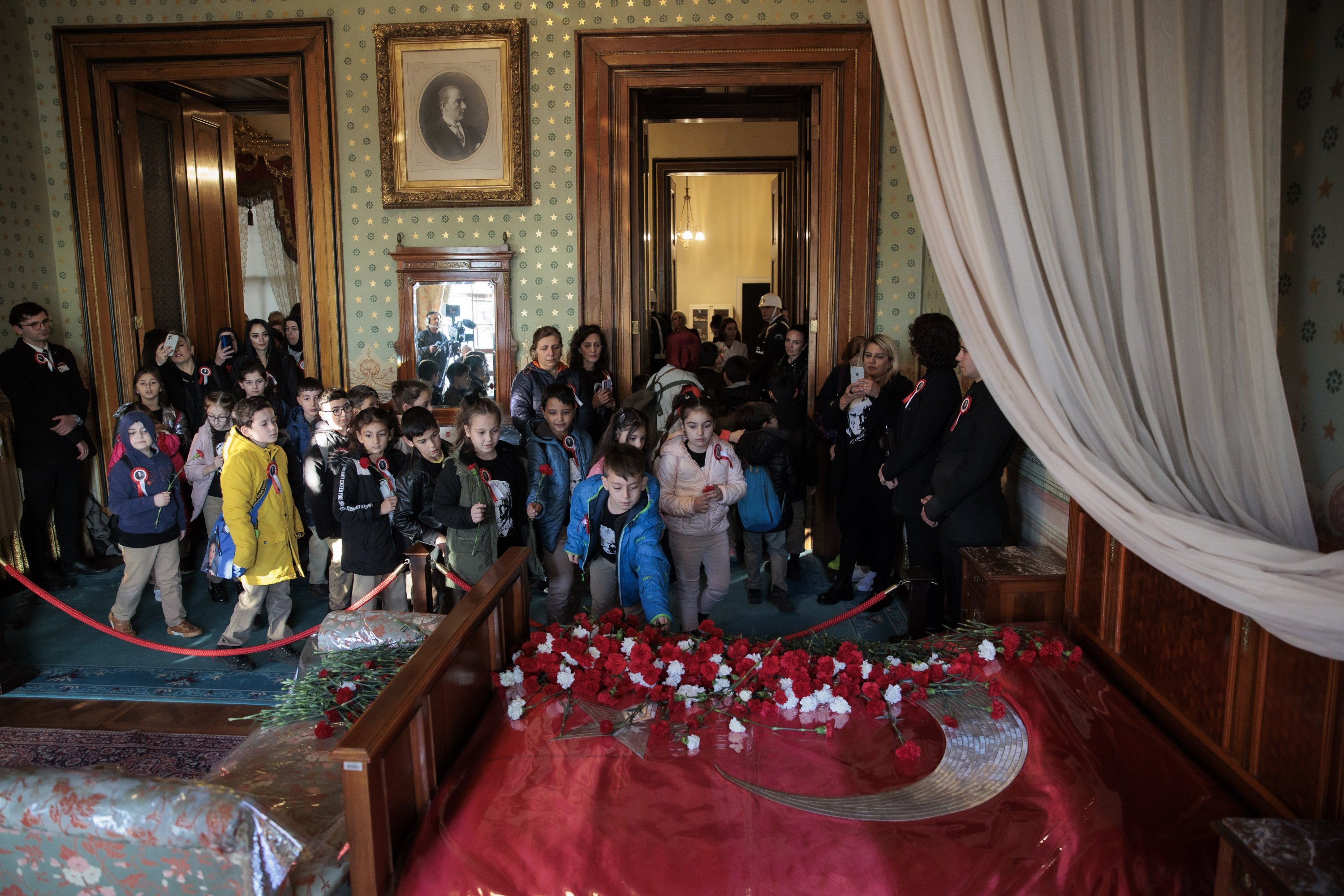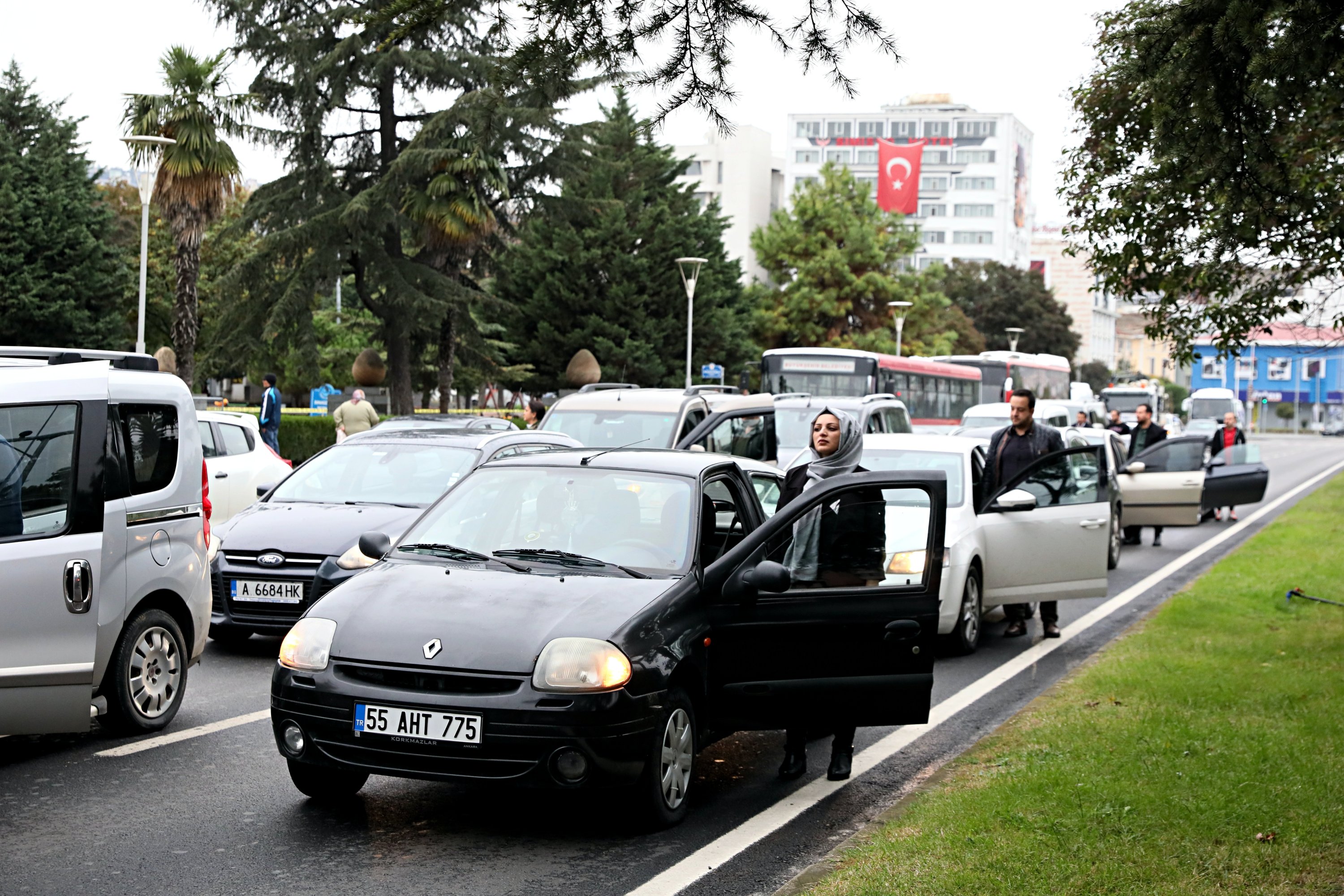© Turkuvaz Haberleşme ve Yayıncılık 2026
Life came to a standstill across Türkiye on Thursday as millions observed a minute of silence at 9:05 a.m., the minute Mustafa Kemal Atatürk, founder of the Republic of Türkiye, died. People paid their respects to the revered figure while ceremonies were held across the country to commemorate the first president of modern Türkiye who shaped the country after commanding a war of independence in the aftermath of World War I.
Central to the commemorations was Anıtkabir, Atatürk's mausoleum in the capital Ankara, where other dignitaries and politicians join the country’s incumbent President Recep Tayyip Erdoğan for a wreath-laying ceremony. Smaller ceremonies were held elsewhere while people streamed into Dolmabahçe Palace in Istanbul, where Atatürk died on Nov. 10, 1938.

Writing in a memorial book at Anıtkabir, President Recep Tayyip Erdoğan said: "We remember you and fellow heroes, martyrs who gave their lives for our independence, on the 84th anniversary of your death. Through our 'Century of Türkiye' vision and as 85 million citizens, we are working to prepare the Republic of Türkiye you described as your greatest work for a future where (the Republic) is more stronger, more prestigious. We will not stop until making our nation's century-old dreams reality, will not be daunted by attacks and resolutely continue our struggle. May your soul be blessed."

Born in 1881 in Thessaloniki, Mustafa Kemal, as he was known before he was given the unique surname which translates as "Father of Turks," died of cirrhosis, 15 years after the foundation of the republic. He started a brilliant military career in the early 20th century and served on multiple fronts during the Ottoman Empire's eventful last years, from Libya to the Balkans. While serving in Sofia as a military attache after years on the battlefield, he sought reassignment to fieldwork. In 1915, he was appointed as a division commander and proved his military mettle as a commander during World War I. He was nicknamed the "Hero of Anafartalar" after a decisive battle on the western front, in Gallipoli. This feat later brought him wider recognition as a skilled commander and a trusted figure as he sought to rally the nation for independence in the aftermath of World War I. It was also his first brush with death, when a piece of shrapnel hit him in the chest, only to be stopped by a pocket watch he kept in his pocket.
His next mission was on the eastern front in 1916, where he managed to stop the Russian incursion and reclaimed the eastern provinces Bitlis and Muş from invading forces, a feat that helped his promotion to the rank of general. In the next two years, he served in Palestine and Syria as commander of the Seventh Army. After the war ended, he returned to Istanbul, the then capital of the Ottoman Empire. His return was at a time of invading forces' occupation of Istanbul, where he worked secretly to organize a nationwide resistance. He found an opportunity to serve this purpose when he left the city as an "army inspector" under the guise of inspecting Ottoman troops scattered across the country. His arrival in the northern province of Samsun on May 19, 1919, is today viewed as the first step toward independence in post-war Türkiye. Once he drummed up the support of fellow commanders and the public during his travels across Anatolia, Atatürk started organizing a formal opposition to invading Allied forces, through conventions in eastern and central Turkish cities. Conventions and congresses paved the way for the foundation of a temporary government independent of the seat of the Ottoman Empire, then in its death throes and a new Parliament strictly opposing any foreign mandate. In 1920, he spearheaded the foundation of the Turkish Grand National Assembly (TBMM) and was elected as its president, as well as head of interim government.
Under his leadership, a ragtag army, with broad public support, was formed and showed the world that a new country was rising among the ashes of the Ottoman Empire. Victories in central and western Türkiye against invading Greek forces in defensive battles in 1921 cemented trust in Atatürk and soon, he was granted the rank of Marshal. In 1922, the army launched the Great Offensive, the first counterattack against invaders. Months after a decisive victory against the Greek army, a cease-fire agreement was signed with Allied forces, paving the way for their withdrawal from Turkish territories. The Lausanne Treaty signed in 1923 officially marked the end of the conflict between invading forces and Türkiye. A few months after it was signed, Atatürk pronounced the formation of the Republic of Türkiye and he was elected as its first president. He remained in this post until his death, being elected successive four times to the presidency.
After the foundation of the republic, Atatürk devoted his life to the reconstruction of a war-torn country, which was also tested by a global economic crisis, while establishing ties with the international community Türkiye once fought. His diplomatic and economic efforts made Türkiye an emerging country with a say in international affairs. On the domestic front, Atatürk is credited with revolutionary changes, including a switch to a new alphabet, a new education system and economic reforms.
